The Law Debenture Corp (LON:LWDB)has delivered robust NAV and share price gains in the first half 2019, supported by an upward revaluation of its independent professional services (IPS) business, which continues to grow well in spite of a tougher capital markets backdrop. The managers of LWDB’s investment portfolio have increased net gearing from c 3% to c 7% in order to take advantage of attractive valuations in selected UK equities. While more than 20% of its diversified portfolio is still invested overseas to gain access to opportunities unavailable in the UK, LWDB has recently moved from the AIC’s Global sector to the UK Equity Income sector, where its NAV total returns currently rank it in the top quartile over three, five and 10 years.
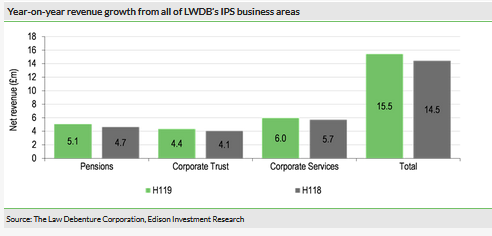
The market opportunity
Global equity markets have resumed their upward trajectory after a significant sell-off in Q418, despite growing evidence of a worsening economic backdrop, and little concrete progress on geopolitical worries such as Brexit and the US-led trade war. ‘Value’ stocks have continued to underperform, bucking their longer-term trend (see Exhibit 3), but could hold up better than highly valued growth companies if the current uncertain climate spills over into a further bout of market volatility.
Why consider investing in Law Debenture?
- Unique structure, with IPS division generating significant income as well as providing future growth potential.
- Value-biased equity portfolio could perform well if the current extended cycle of growth stock outperformance turns.
- 44-year record of increasing or maintaining its annual dividend.
- One of the lowest-cost investment trusts in the AIC universe.
Wider-than-average discount; dividend up 10%
At 23 July, LWDB’s shares traded at a 10.2% discount to cum-income net asset value (with both debt and the IPS business at fair value). While narrower than the 16.5% five-year high seen last October, this is above both short- and longer-term averages. The H119 dividend of 6.6p has been increased by 10% year-on-year, reflecting a 32% increase in group revenues for the period and building on a 9.3% year-on-year increase in the FY18 final dividend.
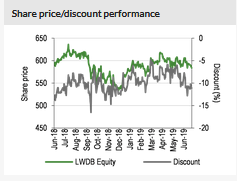
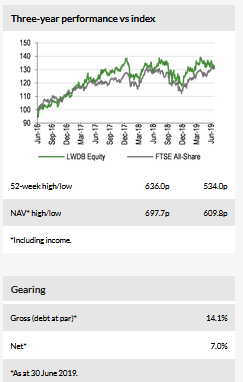
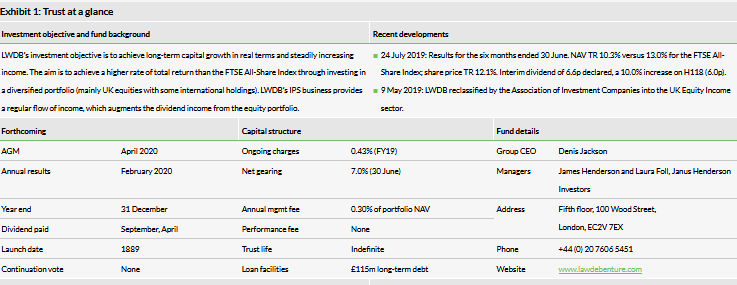
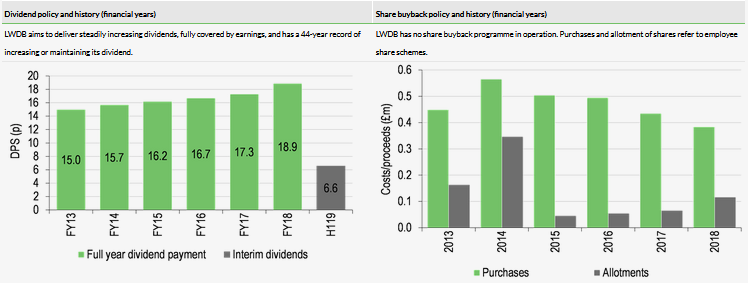
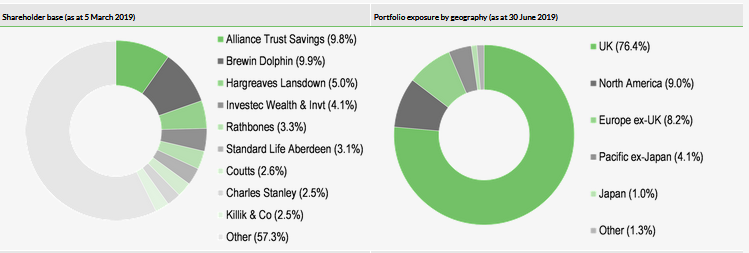
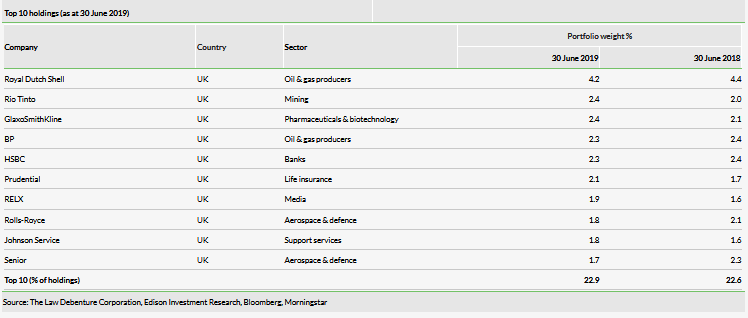
Fund profile: UK-biased trust with unique structure
The Law Debenture Corporation (LWDB) began life in 1889 as a vehicle to facilitate the issuance of corporate debentures. This activity still forms a major part of its independent professional services (IPS) business, which also includes pensions and corporate services (see IPS performance and fair value). The company operates in two distinct parts, with a diversified investment portfolio focused on UK equities making up c 85% of its fair value NAV at 30 June 2019 (end-H119), and c 15% of NAV accounted for by the IPS business. Management of the investment portfolio is delegated to Janus Henderson Investors, where fund managers James Henderson and Laura Foll (who also run the Lowland and Henderson Opportunities investment trusts) aim to achieve long-term capital growth and steadily increasing income from a diversified portfolio of c 140 stocks. Because of the significant contribution of the IPS business to LWDB’s revenues (25% of the total in H119, a lower percentage than in previous years because of the boost to the revenue account of the investment trust from a change in the allocation of management fees between capital and income), the managers have greater flexibility to invest for capital growth, while remaining confident in the trust’s ability to build on its 44-year record of increasing or maintaining its annual dividend.
LWDB has a primarily UK equity portfolio (c 76% of the portfolio at end-H119), with some international exposure to gain access to attractive opportunities that do not have an equivalent in the UK. Because of this, it uses the FTSE All-Share Index as a performance benchmark, and has recently moved from the Association of Investment Companies’ (AIC) Global sector to the UK Equity Income sector. Gearing comes via two tranches of long-term debt and is deployed actively within a working range of 10% net cash to 20% geared. At 30 June 2019, net gearing stood at 7%, an increase from 3% at end-FY18 (31 December).
LWDB is led at the corporate level by Chief Executive Officer Denis Jackson and Chief Financial Officer Katie Thorpe, who are both executive members of the board of directors.
IPS performance and fair value
LWDB presents its IPS business in three divisions: pensions, corporate trusts and corporate services. Overall H119 results for the IPS business built on the growth achieved in FY18 under new CEO Denis Jackson (appointed in January 2018), in spite of a tough market backdrop in several of the businesses’ areas of operation. Revenues for the IPS business were 6.9% higher in H119 than in H118, while profit after tax was up 8.9% as costs were contained to a 6.1% increase, although LWDB continued to invest for growth. For the pensions business, revenues grew by 9.3% in H119 (compared with H118), the strongest growth of all LWDB’s IPS segments and towards the top end of the target of mid- to high single-digit growth. The corporate trusts business saw a 7.4% increase in revenues, while income from corporate services grew by 4.6%.
LWDB’s pensions business includes its independent trustee services business (established for 50 years and the largest of its kind in the UK), as well as Pegasus, an outsourced pension administration and governance service, launched in 2017. LWDB’s pension trustee business provides experienced professional trustees to both defined benefit (DB) and defined contribution (DC) schemes, and Jackson says both this business and Pegasus continue to benefit from a regulatory drive towards consolidation and improvements in the governance of company pension schemes. This was exemplified by a recent report from The Pensions Regulator calling for ‘fewer, better-governed schemes’. Thorpe adds that the pensions business has strong recurring revenues as well as potential for future growth, and continues to attract a high calibre of new hires.
The corporate trusts business also performed well in H119, despite the low level of corporate debt issuance and merger and acquisition (M&A) activity (for which the division provides escrow agency services) in Europe. The business primarily acts as a bridge between the issuer of a bond or loan and the lender/investor, in order to protect the interests of the investor. Around two-thirds of annual revenues are contracted, with the balance coming from a mixture of acceptance fees from new issuance and special fees from bankruptcy situations, both of which are more dependent on market conditions. Thorpe says the H119 result is partly an increase in ongoing revenues (from new business won in the previous year), as well as some exceptional items. Jackson adds that the focus for corporate trusts remains on winning new ongoing business to facilitate long-term growth as well as replacing what rolls off as a result of maturities.
Corporate services saw the weakest increase in revenues for H119 over H118, but still improved after seven years of broadly flat revenue growth across the IPS business until end-FY17. The main corporate services business is in helping clients to establish and maintain special purpose vehicles (SPVs), by providing governance, administrative, accounting, process agent and company secretarial services. The formation of SPVs is often associated with new issues, and the relatively lacklustre capital markets backdrop so far in 2019 (particularly in Europe) has proved a headwind for the division. Most of the business is international and is concerned with cross-border vehicles. A much smaller part of corporate services – although the biggest contributor to its revenue growth in H119 – is Safecall, a whistleblowing service that has continued to see a strong flow of new corporate clients. Jackson remains confident on Safecall’s growth prospects and says the evidence from H119 is that ‘it continues to be in the right place at the right time’.
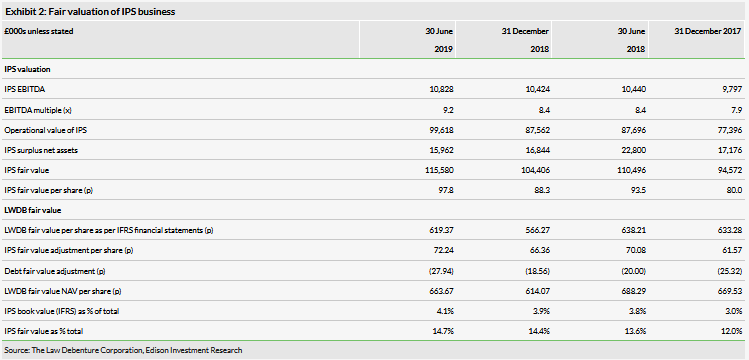
LWDB carries the IPS business at book value in its IFRS financial statements, but also provides an independent assessment of its fair or market value, which is substantially higher. This figure is based on an appropriate multiple of historical EBITDA, and allows investors to make a more accurate assessment of LWDB’s fair value. As shown in Exhibit 2, the EBITDA multiple has been raised from 8.4x at end-FY18 to 9.2x at end-H119. The multiple is based on an undisclosed basket of broadly similar companies, adjusted for differences in size, liquidity, margins and growth rates.
The operational value of IPS rose by 13.8% in H119 and the fair value of IPS per share rose by 10.7%. At 97.8p per share, the fair value of IPS accounted for 14.7% of LWDB’s NAV per share (with debt at fair value) at end-H119, up from 14.4% at end-FY18. The IFRS book value of IPS rose from 21.8p to 25.5p per share (+17.0%) during H119; the 72.2p IPS business fair value adjustment was an 8.9% increase from 66.4p at end-FY18.
The fund managers: James Henderson and Laura Foll
The managers’ view: Maintaining a preference for value
Although they do not follow a ‘deep value’ investment approach in any of the funds they manage (particularly not LWDB, where portfolio income is supported by IPS business revenues), Henderson and Foll have a strong preference for stocks that are trading at lower-than-average valuations. With this in mind, they admit that their recent trading activity – trimming holdings that have performed well and are trading at higher valuations, and adding to companies (mainly in the UK) that are out-of-favour but have a clear path to earnings growth – could detract from short-term returns. However, they also point to the long-term tendency of stocks with a lower starting valuation to outperform (see Exhibit 3, MSCI World Value versus MSCI World Growth), and argue that after 10 years of strong performance from what are perceived to be high-quality growth stocks, valuations for these companies are now at levels that in many cases look unsustainable. LWDB Chief Financial Officer Thorpe also argues that to have achieved a six-month NAV total return of c 10% is impressive when both value stocks and the UK in general are unloved by the majority of investors.
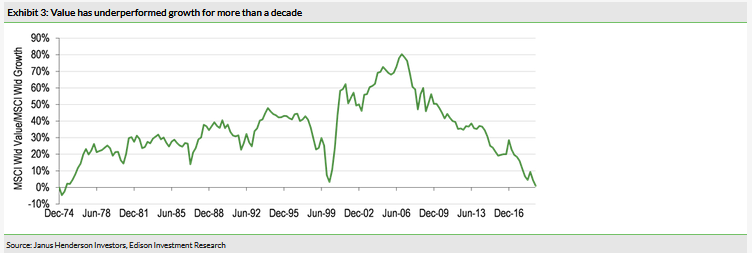
Henderson comments that ‘there are some real bargains to be had’ currently in the UK stock market, such as Eddie Stobart Logistics, which is trading well and has good prospects for dividend growth, yet ‘looks very much the wrong price’ on a forward P/E ratio of c 5x. He describes his and Foll’s current approach to the UK market – where they have recently invested an extra £50m through increasing LWDB’s gearing – as ‘opportunistic but not gung-ho’. However, Foll adds: ‘If we find value that is not in the UK, we will buy it, such as [recent purchase] Bristol-Myers Squibb’.
While not driven by the change in AIC sector from Global to UK Equity Income, Henderson says most signs currently point to a further increase in LWDB’s UK exposure from the current c 76%. ‘If it takes five years before the value/growth trade turns, we will have more in the UK [because of buying more attractively valued UK stocks]. If it turns more quickly, the UK will still go up [because value stocks will outperform].’
Many of the recent purchases in the UK have been bought at attractive dividend yields, because share prices have fallen while dividends have not been cut. Henderson adds: ‘We are moving more towards yield in the understanding that the wind is in our face. But we are adding to the UK from a [total return] investment perspective, not for yield alone.’
Asset allocation
Investment process: One-stop shop for quality equity exposure
LWDB’s portfolio managers aim to hold a diversified portfolio of quality, primarily UK-listed companies. Even before the recent move to the AIC’s UK Equity Income sector from the Global sector, more than 70% of LWDB’s assets were invested in UK equities, with the overseas portion used to give access to attractive investment areas where there is no compelling UK-listed equivalent (for example, Microsoft (NASDAQ:MSFT) in the case of large-cap technology stocks). The only change to the geographical allocation guidelines (see Exhibit 3) as a result of the sector change has been an increase in the maximum UK weighting from 80% to 85%.
Henderson and Foll own a relatively long list of stocks (139 names at 30 June 2019) in order to mitigate company-specific risk and provide a good spread of underlying business areas. They invest across the market capitalisation spectrum on a bottom-up basis, based on their rigorous assessment of company fundamentals, although LWDB has more of a large-cap bias than some of the managers’ other funds, with around two-thirds of the portfolio in FTSE 100 names (or overseas equivalents). Henderson and Foll aim to invest in growing businesses whose current share price does not reflect their long-term growth prospects. Although the managers are mainly focused on the UK market, they sit within Janus Henderson’s global income team, which gives them access to overseas stock ideas. James Ross is responsible for European stock selection in the LWDB portfolio, while Henderson and Foll oversee the UK and North American stocks, as well as fund selection in Asia and emerging markets, which LWDB rarely invests in directly. The managers tend to build and exit holdings gradually (which also contributes to the length of the stock list); the average starting position is c 0.3% of NAV, although some very large companies may enter the portfolio as a bigger percentage; for example, recent purchase Royal Bank of Scotland (LON:RBS) is almost 1% of NAV.
The managers’ patient approach to investing is reflected in LWDB’s relatively low level of portfolio turnover, which stood at 15.4% in FY18 (FY17: 14.0%). The figure for H119 was slightly higher (an annualised rate of 18.6%), driven by greater buying activity as a result of an increase in gearing over the six months. Positions may be reduced and ultimately sold where valuations have become stretched (and future upside is therefore limited) as a result of strong performance, or when there is a deterioration in fundamentals.
Because of the significant contribution (c 25% in H119, but closer to 40% historically, prior to the recent change in the allocation of investment management fees between the revenue and capital accounts) from the IPS business to LWDB’s total revenue, Henderson and Foll have the freedom to invest part of the portfolio in lower-yielding stocks while still achieving the trust’s objective of providing long-term growth and a steadily growing income. However, when deploying gearing they will tend to target stocks that have yields above the cost of LWDB’s borrowing (currently c 4.6%) and can thus provide immediate upside. The portfolio yield is currently c 4.1% on a 12-month forward basis, an increase on six months previously, partly reflecting the use of LWDB’s gearing to buy into out-of-favour UK stocks on attractive yields.
Current portfolio positioning
At 30 June 2019, there were 139 stocks in LWDB’s portfolio. This included seven collective investment funds, which made up 6.8% of the total (end-FY18: seven funds and 6.9% of the total). The total number of holdings was unchanged compared with six months earlier, although there were some changes at the stock level. The top 10 holdings made up 22.8% of the portfolio, virtually unaltered from 22.6% a year earlier.

In geographical terms (Exhibit 4), the main change compared with 12 months earlier has been a 3.3pp increase in the UK weighting. The managers stress that this is in response to investment opportunities rather than LWDB’s move from the AIC Global sector to the UK Equity Income sector. However, the slight increase in the upper bound of the board’s allocation guidelines for UK exposure (from 80% to 85%) is largely a result of the sector change. North American exposure has slightly increased compared with 12 months ago but is lower than at end-FY18 (9.4%). All other regions have decreased somewhat over the past 12 months.
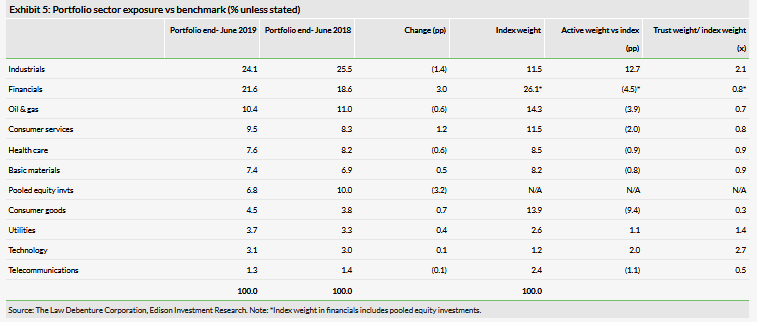
The portfolio remains well diversified by sector (Exhibit 5), with few major changes over the past 12 months. The biggest increase in exposure was to financials (+3.0pp), largely as a result of new positions in Royal Bank of Scotland and Lloyds Banking Group (LON:LLOY). The largest decrease over 12 months was in pooled equity investments (-3.2pp), with most of the activity occurring in H218, although the position in Stewart Investors Asia Pacific Leaders has been trimmed in H119. The portfolio sector exposure differs markedly from that of the index, with a large overweight in industrials (+12.7pp), where Henderson and Foll continue to find attractively valued opportunities, and a significant underweight in consumer stocks (-11.4pp across consumer goods and consumer services), where many companies are trading at historically high valuations, in spite of the uncertain economic outlook.
The managers have been net buyers of stocks in H119, raising LWDB’s gearing from 3% at end-FY18 to 7% at end-H119. They have invested an extra £50m into UK companies, most notably in RBS and Lloyds. Foll says LWDB historically had no exposure to the big UK banks, but both currently look like attractive total return opportunities, trading below book value (giving scope for capital appreciation) and with dividend yields of c 6–7%. The managers have also added to existing holdings in cruise operator Carnival (NYSE:CCL) (whose shares had sold off on news of pockets of weak demand in Europe), property company Hammerson (trading at a c 60% discount to the value of its estate) and insurer Direct Line (sustainably yielding more than 9% on the back of stable revenues, despite tough conditions in the motor insurance market). Away from the UK domestic sphere (although still listed in the UK), the managers have also added to Hipgnosis Songs Fund, part of an allocation to high-yielding, less correlated funds that includes Foresight Solar and Urban Logistics REIT.
Henderson and Foll were net sellers of stocks in the US (-£9m), Europe (-£4m) and Asia-Pacific (£1.5m) over the six months. The position in US healthcare supplies firm Becton Dickinson was sold completely on fears that its valuation had become over-extended, while holdings in US technology stocks such as Microsoft and Lam Research (NASDAQ:LRCX) were trimmed. However, a new position was bought in pharmaceutical giant Bristol-Myers Squibb (NYSE:BMY) (currently undergoing a merger with biotechnology major Celgene (NASDAQ:CELG)), which is trading on a 12-month forward P/E of less than 8x.
Performance: H119 sees strong absolute returns
